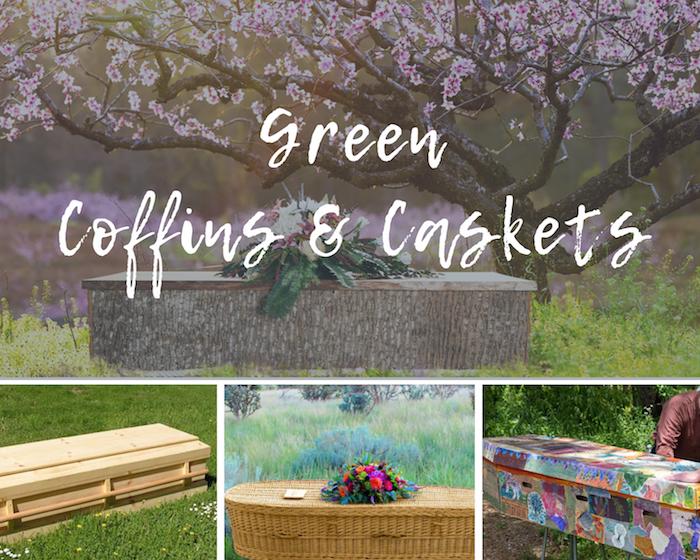Biodegradable Burial Containers for Green Burial: Part 2 – Coffins & Caskets
This is the second blog in our series about Biodegradable Burial Containers, where we explore biodegradable options for green burial. In the first blog we discussed, what is a biodegradable burial container, why choose a biodegradable burial container, and talked about the first option, burial shrouds. In this blog, we pick up from there to talk about other green burial options, focusing on coffins and caskets.
So what is the difference between a coffin and casket anyway? The two words are often used interchangeably, but the technical difference is that a coffin has 6 or 8 sides that naturally mimic the body’s shape (wide at top, narrow at the bottom) and a casket is rectangular. During the 1800’s, as funerals moved away from being a family affair and into the hands of “undertakers,” the emerging funeral industry moved away from coffins and opted for caskets instead. At the time, the term “casket” referred to a jewelry box (where you would put a precious object), and it was thought that the rectangular design was less offensive as it did not so obviously allude to the body inside (Harris, 2007, Grave Matters, p.43). Many modern day makers of biodegradable burial containers are reclaiming the 6-sided design and term “coffin” as a way to help us embrace death as a natural part of life, versus something to shy away from. Here’s a fun little video if you want to learn more.
You don’t have to be buried in a coffin or casket to be buried in a green cemetery (a burial shroud will suffice) but here are some green burial approved options for coffins and caskets, with descriptions, prices, and where to buy.
Cardboard Coffin
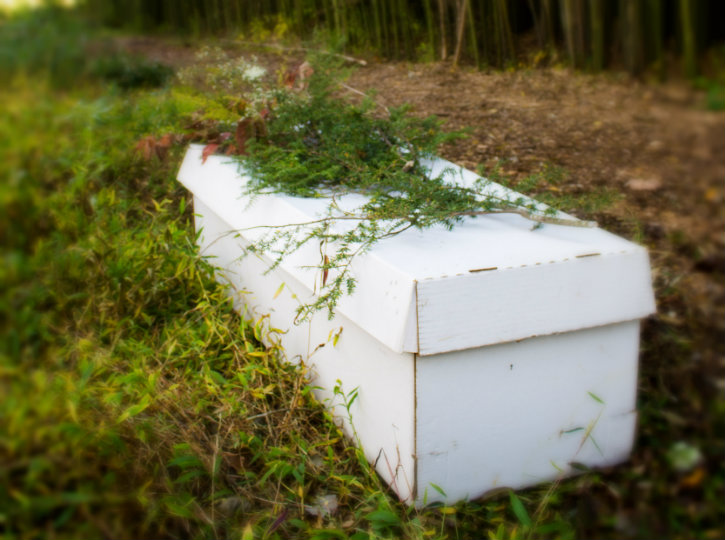
I’m imagining all the raised eyebrows and funny thoughts when people first hear the words “cardboard coffin.” It’s easy to think that cardboard = cheap, but that’s simply not the case with the custom designed coffins made specifically for green burial from Mourning Dove Studio. Carol Motley, who is passionate about green burial, spent years designing a sturdy biodegradable coffin manufactured in “a factory that uses environmentally sustainable practices and is certified by the Forest Stewardship Council (FSC). The cardboard is made with a bleach-free process, using 25-35% recycled material and a starch-based adhesive. No metal, no toxins.” Other funeral homes carry cardboard coffins but we assure you, there is no comparison. The ones you can purchase from funeral homes are less expensive, although in our experience, not as stable when transporting, and they are processed with bleach and other chemicals. The coffins made by Mourning Dove Studios are sturdy, well made, and environmentally friendly. They measure up to 6’2” and carry up to 350 pounds and can be used for both burial and cremation.
So what’s so special about a cardboard coffin anyway? You can personalize them. They can be painted, notes and last words to loved ones can be written on them, pictures with your memories can be decoupaged onto them. One of the essential practices for processing grief is performing rituals and acts of love – and the time and love put into personalizing a cardboard coffin gives people the opportunity to perform an act of love and recall memories of a loved one as notes are written or pictures are decoupaged onto the coffin. This is a wonderful opportunity for children to be involved in a way that lets them express their love and gratitude without feeling set aside to simply observe adults taking care of death. Watch this video to learn more about the inspiration behind these coffins.
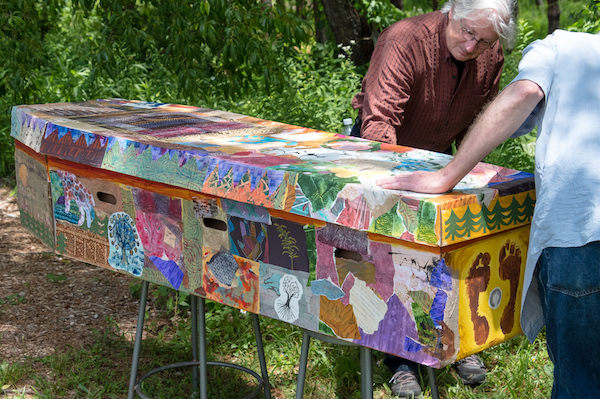
Cardboard Coffin Cost
$300
Where To Buy Cardboard Coffins
If you are in the Asheville area, you can purchase them from us. If you are not local to the Asheville area and are interested in purchasing one of Mourning Dove Studio’s coffins – contact Mourning Dove for more info.
Woven Fiber Casket
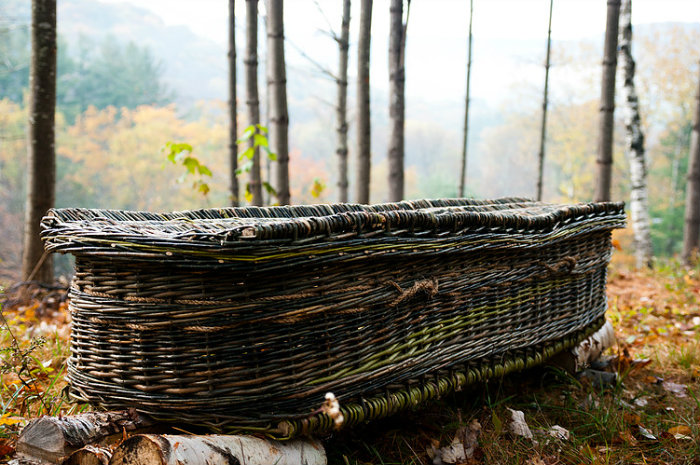
There is no denying the loveliness of these caskets. They are just pretty! The name is exactly what it implies – they are caskets made of woven materials, in this case, biodegradable and from sustainable sources. They are usually designed with handles, can include liners to prevent leakage, weigh about 50 pounds, and can carry up to 350 pounds. The body can be placed directly inside the casket, or be placed in a shroud and then placed inside the casket. Woven fiber caskets can be used for both burial and cremation.
Woven Fiber Casket Options
Fiber options come from renewable materials and include bamboo, willow, seagrass, cotton, banana leaf, and rattan. They come in a variety of shapes such as oval, hexagonal (coffin shaped), or rectangular. The natural fibers lend to an assortment of eye pleasing natural colors.
Woven Fiber Casket Cost
$950-2800
Where To Buy Woven Fiber Caskets
- Local: Moss & Thistle Natural Casket Company is located in Western North Carolina
- Mary Lauren Fraser located in Vermont
- Natural Burial Company Store
- Urns Northwest
- Passages (they deal mostly in wholesale, but call them and they will help you locate their products)
Green Tip: Most woven caskets are made in Indonesia. The companies that import them go to great lengths to minimize the carbon footprint in importing them. That being said, if you go with Moss & Thistle Natural Casket Company or Mary Lauren Fraser mentioned above, you are minimizing carbon footprint.
Wood Caskets
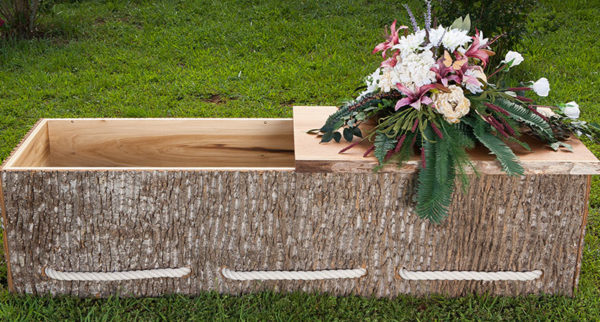
Wooden caskets appropriate for green burial combine the look and feel of a traditional casket with an eco friendly approach to construction and are an attractive choice for those who find comfort in familiarity. Wood caskets approved by the Green Burial Council contain no metal, or at least a very minimal amount (some use metal screws), and do not use toxic stains or sealants. Many are also made by hand versus in a large manufacturing plant, such as the thousands sold every day at most funeral homes. Most wooden caskets you will find at a funeral home are made of exotic and precious trees, leading to deforestation; the amount of wood used each year in the U.S. to construct wooden caskets is 4 MILLION acres of forest, which is enough wood to construct 4.6 million single family homes. Pine trees are a wonderful alternative. They are a sustainable and renewable choice based on their speed of growth and ability to replant and they are abundant in the U.S.
Wood Casket Options
When it comes to wood caskets, choose pine if it’s available, and go local if you can and support a local woodworker. Although many wood caskets use a small amount of metal screws or nails for construction, some woodworkers are skilled in the dovetail method, which is a joinery method that brings wooden edges together without using nails or screws. Styles of wood caskets vary from a simple rectangle, the hexagonal coffin shape, to ones you would typically find at a funeral home with a domed lid.
Wood Casket Cost
$450-$1800
Where To Buy Wood Caskets
- Local: Green Man Casket Co. (featured in the picture above) and Aldergrove Caskets are both located in North Carolina.
- The Old Pine Box (beautiful coffins with a wide range of prices)
- Nature’s Casket
- Northwoods Casket Company (More conventional looking. Not all their options are green burial approved – remember to avoid metal, veneer, and varnishes.)
DIY: Build It Yourself
If you or someone you know is handy with wood, you can save a lot of money and build a casket or coffin yourself. This is a great opportunity to recycle wood as well. Here are some DIY casket resources:
- Simple Pine Box (with rope handles)
- How To Build a Coffin (video)
Green Tip: If you decide to build your own casket, be mindful of the materials you use. Avoid tropical woods, select wood that isn’t treated with chemicals, and avoid chemically based stains and varnishes.
Green Caskets + Funeral Homes
Realistically, the majority of people are not going to purchase a coffin or casket in advance and so will rely on the help of a funeral home at the time of death. Luckily, the funeral industry is starting to catch up with the green burial movement and some are starting to offer environmentally friendly caskets. If you find yourself in this position, instead of calling every local funeral home, start by calling the natural burial ground nearest you. They will have already worked with local funeral homes and know which ones supply green caskets. Even if you end up working with a funeral home who doesn’t carry a green certified coffin or casket – this is very important to remember: the Federal Trade Commission’s Funeral Rule states,
Buy only the funeral arrangements you want. You have the right to buy separate goods (such as caskets) and services (such as embalming or a memorial service). You do not have to accept a package that may include items you do not want.
You have the legal right to purchase the burial container of your choosing (including a shroud) and the funeral home must accept it. If they push back or tell you otherwise, you might consider working with a different funeral home. If you want to help drive the green burial movement forward, let your local funeral home know that you are interested in green burial approved options.
Originally published 3.15.17. Updated 7.31.19
Part 3 in the series will cover some of the more “unusual” options for natural burial. Join our newsletter and follow us on Facebook so you know when our next blog is published. If you are interested in learning more about green burial options or scheduling a tour at Carolina Memorial Sanctuary, please feel free to contact us. We love exploring the possibilities and sharing what we know.
